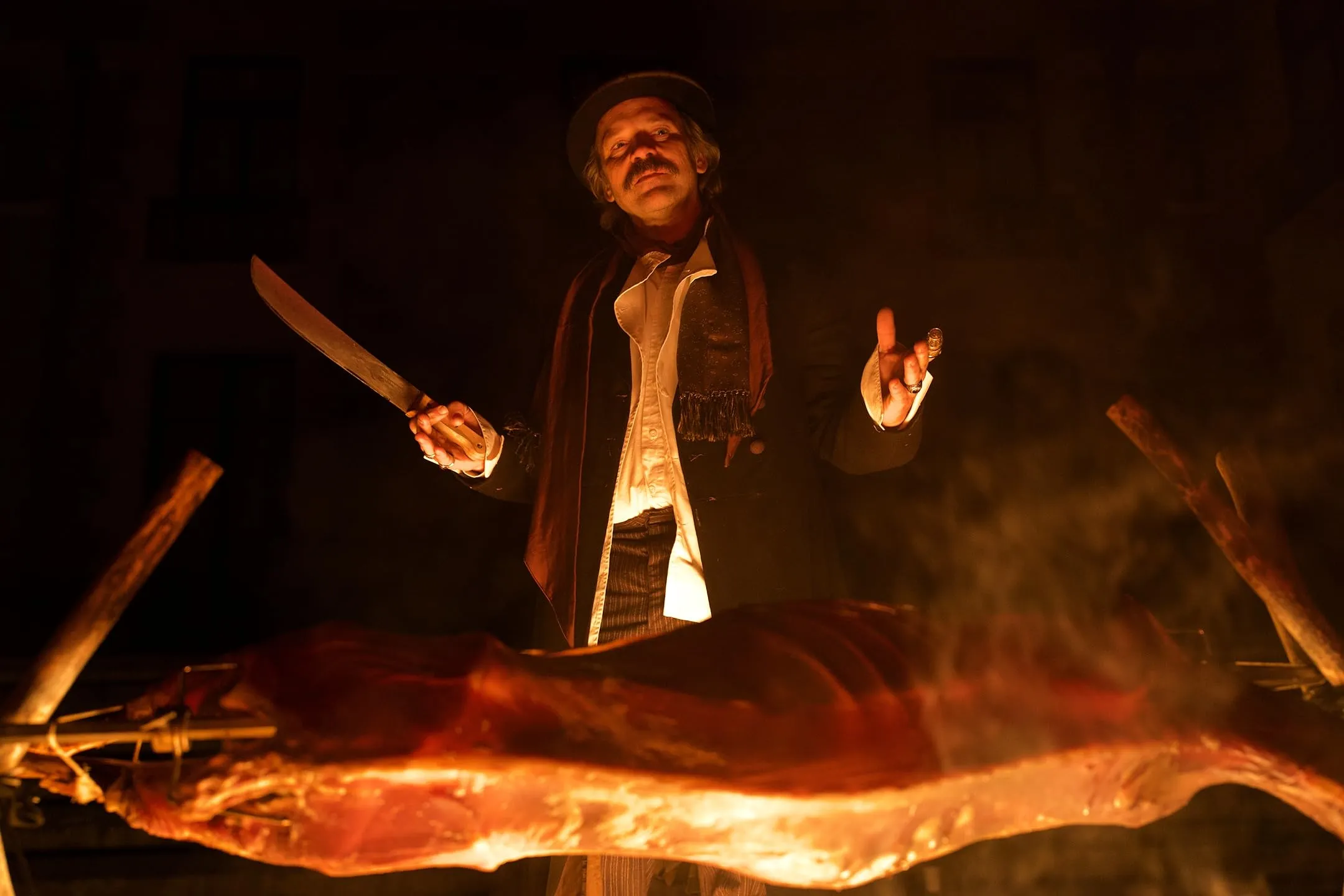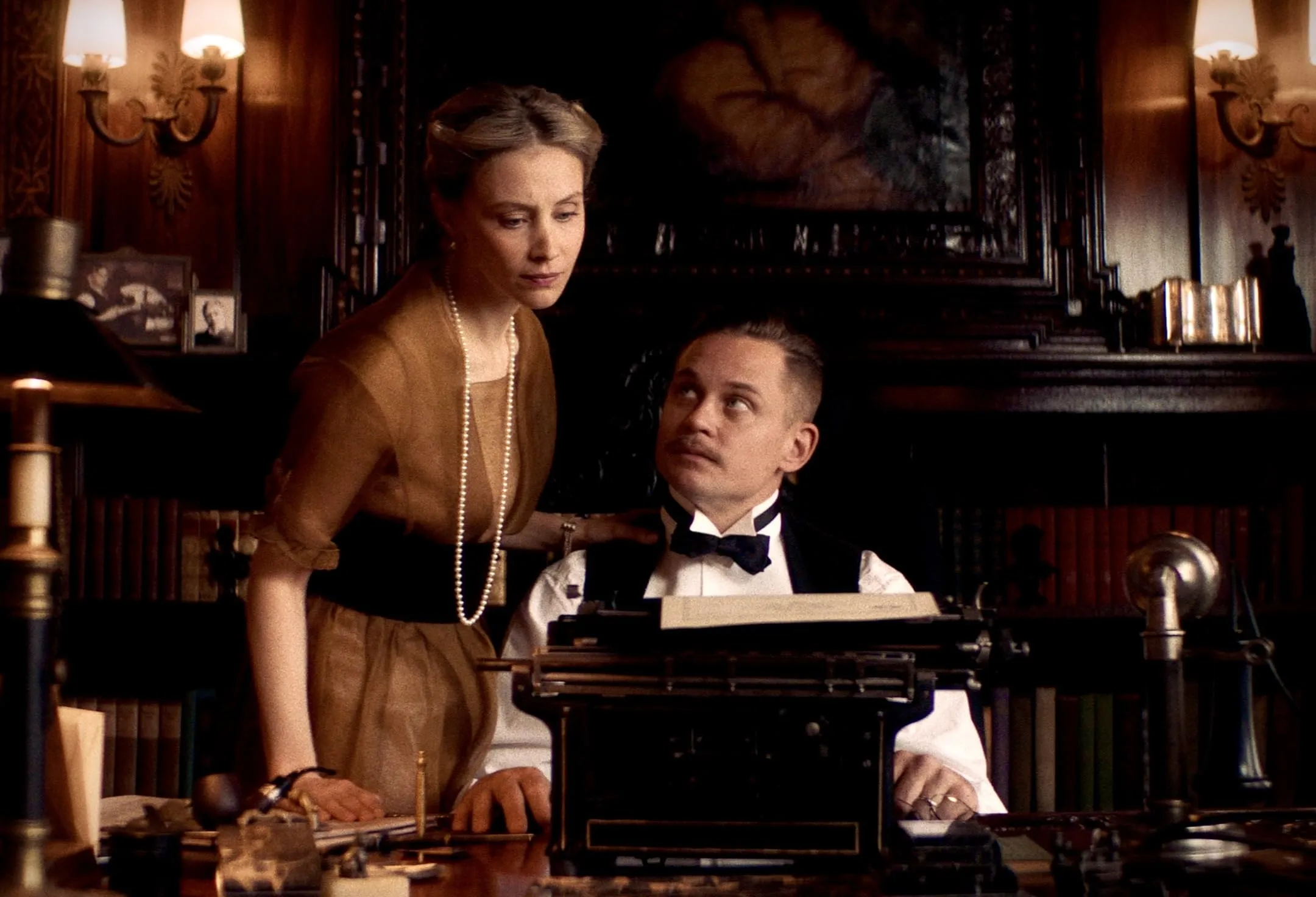As the 1918 Spanish flu pandemic spreads across the United States, a servant named Floyd Monk arrives at the mansion of journalist JC Horton on remote Egg Island. Played with sly charm by Peter Sarsgaard, Floyd is a newcomer to the household staff. But as the flu cuts the family off from the outside world, Floyd sees an opportunity.
Sheltering in their lavish home, JC writes fiery articles about urban struggles. But as portrayed by Billy Magnussen, JC is less a man of the people and more a hypocrite enjoying wealth and luxury. Directors Austin Stark and Joseph Schuman critique such privileged figures through this tale of socioeconomic tension during a health crisis.
Inspired by stories of the privileged fleeing to second homes during COVID, the film raises thought-provoking themes that feel remarkably relevant. Set amid the 1918 pandemic, it draws parallels to society’s inequalities laid bare by recent world events. As the pandemic isolates the family, manipulative chef Floyd methodically turns the other servants against their master.
This allegorical revolution begins subtly but soon engulfs the household. Led by the inimitable Sarsgaard and a talented cast, the film uses its single confined setting to stir thoughtful debate on class and the crises that divide society both today and in the past.
The Gilded Cage of Egg Island
The secluded world of the Horton estate acts almost as another character in Coup!. Set on a grandiose mansion on New York’s isolated Egg Island, the setting provides the perfect environment for the class tensions at the film’s core to play out.
We see the lavish main house where the family resides in pampered luxury, yet the production design makes it feel every bit the imposing gilded cage. Meant to evoke 1918 architecture and fashions, the ornate interiors emphasize the Hortons’ entitlement. Meanwhile, the servants live a short walk down a winding path, confined to their own spartan quarters.
This separating of classes into different areas of the expansive grounds creates an ever-present reminder of social strata. It also facilitates the plot’s dynamics as the pandemic locks everyone within the estate’s walls. With the servants and family now trapped together in close quarters, long-simmering resentments rise quickly to the surface.
As the world outside succumbs to deadly illness, tensions mount intensely under this enclosed setting. But the island location also reinforces each character’s lack of escape from their surroundings and from each other. The isolated mansion adds an intriguing sense of atmosphere, becoming a microcosm where the clash between the privileged and underprivileged plays out in volatile ways.
The Characters Behind the Coup
Two very different men lie at the heart of Coup! and drive its unfolding drama. Peter Sarsgaard is simply magnetic as Floyd Monk, the mysterious chef who turns up at the Hortons’ estate with secrets in tow. From the moment we meet him fixing a false mustache, there’s an air of danger and intrigue around Monk. Yet Sarsgaard’s natural charisma also lets him slip past the defenses of those around him.
Monk effortlessly wins over the children with card tricks and stories, drawing them into his web. But his true target is always toppling the pompous J.C. Horton from his perch of power. Billy Magnussen portrays Horton as the quintessential hypocritical liberal—all talk of equality but living large off family wealth. Magnussen ensures Horton becomes utterly detestable in his arrogance and condescension towards servants.
These servants, like the sensible Mrs. Tidwell, played with compassion by Skye P. Marshall, are side characters but vital to exposing the time’s social injustices. As a black woman with dreams of medical school, Mrs. Tidwell represents the marginalized people Horton claims to champion. Meanwhile, Kristine Nielsen lends Mrs. McMurray a stern dignity yet also makes her flaws in clutching the status quo understandable.
Sarsgaard breathes mischievous life into Monk, lighting up scenes with roguish charm yet hinting at deeper pain. This complex, enigmatic man is the catalyst stirring rebellion in a household numbly enduring abuse. Magnussen ensures we relish every moment the deserving Monk chips away at Horton’s grip, bringing Coup!’s timely critique of inequality to a head in their battle for control of the estate.
The Rumbles of Revolt
Within Coup!’s confined walls, tensions between the classes play out with bubbling intensity. As the mighty journalist J.C. Horton writes breathless prose about the streets, his pen obscures the grim reality under his own roof. You see the servants live apart, in cramped quarters, looking up at their masters in the grandeur above. They face risks to tend to the family’s needs but receive scant thanks.
This oppressive order faces its reckoning when the pandemic rings its isolating curtain. With the outside world shut off, the servants’ subservience crumbles. Monk’s arrival unleashes dormant dreams of dignity and fairness, giving steel to demands for fair pay and lodgings within the estate’s empty rooms. Horton’s shocked outrage as he loses control reveals privilege used to never facing resistance.
As society faced fear and loss, some fled for safety and space in luxury mansions as others suffered in the city. So too does the movie draw blurred parallels to recent times and America’s inability to close the chasm between the classes. Its message is clear, if not always subtle, that even in crisis, the powerful shelter apart while preaching sacrifice from afar. When society is upended, will the meek find courage to challenge injustice wherever it lies?
While some might wish for deeper exploration, Coup! accomplishes its aims with fun and friskiness. It reveals the grumbles of discontent beneath the silken surface and how rebellion can start from the most unlikely sparks. When the curtains fall and masks are lifted, will we finally recognize how little has truly changed since that prior pandemic forever altered the world? In confined times, even the smallest flame can set the mightiest of structures alight.
The Crafty Confines of Coup!
Directors Austin Stark and Joseph Schuman faced a tricky task with Coup! – crafting an engaging story within the closed walls of a mansion during a pandemic. Yet through tight construction and a blend of tones, they open a window into societal issues too.
The film shifts deftly between humor and drama. Sarsgaard brings lightness with his charming rogue monk, easing tensions while stirring revolt. Yet darker themes of inequity and injustice simmer beneath. Through these tonal shifts in just 97 minutes, the directors pack their message in neatly.
Visually, cinematographer Stefan Fuitjens shoots within the bounds of Edwardian interior spaces. But his camera doesn’t feel confined, sliding fluidly between characters. His roving eye catches the power dynamics at play, from lofty masters to servants pushed to corners. Even in restriction, he brings the viewer into the unfolding intrigue.
Production designer Andrew Finn Foster also deserves praise. His period-perfect sets breathe life into this historical tale. From grandiose halls to cramped quarters below, the environments convey all that’s left unsaid between the classes. Through meticulous costumes and decor, he transports the audience while serving the story.
Despite hurdles of location and setting, Stark and Schuman infuse Coup! with visual panache. They exploit the architectural dynamics to bring tension to the boil. While themes of injustice and social change aren’t subtle, the skilled craft on display ensures the film is anything but two-dimensional. Even in closed rooms, through cinematic flair, the directors force open windows to the world outside.
The Servant’s Revolt: Coup!’s Themes Resonate
Coup! tells a timely tale that’s equal parts comedy and critique. At its core are issues of class, privilege, and the will to rise up that still feel fresh.
Monk drives the plot as the scrappy “little guy,” causing chaos. Viewers can’t help but root for him, grinning as the privileged face consequences. But it’s not so simple—both sides have their flaws.
The film shines a light on societal fault lines with a deft comedic touch. Stark and Schuman poke fun without preaching. Their period setting delivers commentary in a low-stakes package.
Some wish Coup! dug deeper. But for a small film, it packs big themes into a tight package. Not every story must solve society’s problems to start conversations that could move us closer to understanding each other.
The questions this film evokes about inequality, hypocrisy, and what real change requires are timeless. By bringing levity to heavy topics, it ensures its provocations will echo for years to come. Even if answers remain elusive, we’re fortunate when art can keep us questioning.
In these divided times, Coup!’s ability to engage and amuse without anger is no small accomplishment. For starting discussions instead of more heat, its revolt deserves applause.
The Review
Coup!
While more nuanced exploration may have deepened the film's commentary, Coup! succeeds in its goal of bringing levity, and perhaps unity, to fractious issues through good-natured humor.
PROS
- Engaging performances from Sarsgaard and Magnussen
- Timely commentary on class divide and flaws of privilege
- Delivers social critique through comedy in digestible format
- Provides entertainment while raising provocative questions.
CONS
- The plot is relatively simplistic and predictable.
- Characters lack nuanced depth beyond archetypes.
- Themes could have been explored in a more rounded way.
- Humor may undermine political message for some.



















































Discussion about this post